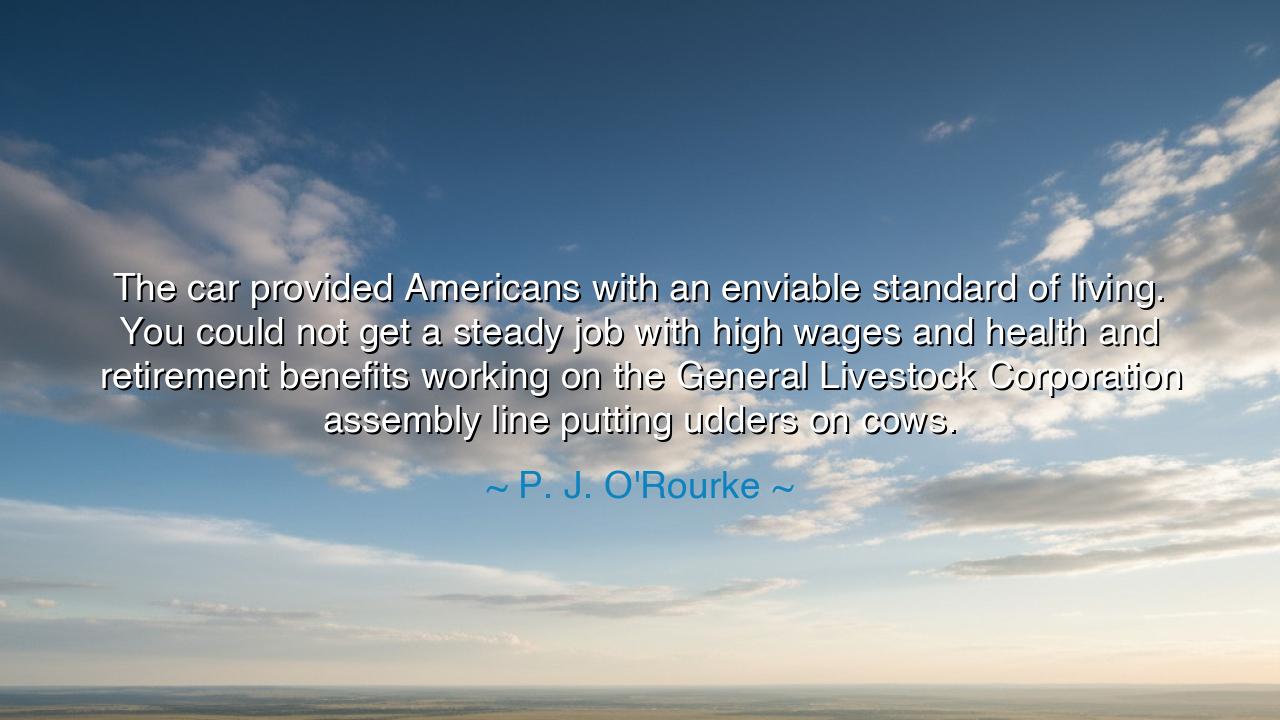
The car provided Americans with an enviable standard of living.
The car provided Americans with an enviable standard of living. You could not get a steady job with high wages and health and retirement benefits working on the General Livestock Corporation assembly line putting udders on cows.






The words of P. J. O’Rourke—“The car provided Americans with an enviable standard of living. You could not get a steady job with high wages and health and retirement benefits working on the General Livestock Corporation assembly line putting udders on cows.”—carry a vivid observation of both innovation and human prosperity. At first glance, his remark is humorous, even biting, yet beneath it lies a profound truth about the transformative power of technology and industry. The automobile, more than a machine, became a vehicle of social mobility, economic stability, and personal freedom, reshaping the very fabric of daily life and opportunity in a young and ambitious nation.
O’Rourke’s comparison between the assembly line of cows and the assembly line of cars illustrates a deeper historical reality: that some innovations do more than create products—they create lives worth living. Before mass-produced cars, labor was often grueling, repetitive, and minimally rewarded. The “General Livestock Corporation” imagery paints a world of toil, where work is necessary but barely sustaining. The car industry, by contrast, offered steady employment, high wages, and benefits that allowed Americans not only to survive, but to flourish—building homes, raising families, and enjoying leisure. It became a cornerstone of a society in which dignity and opportunity were tangible.
The origin of this quote lies in the social and economic revolution brought about by Henry Ford and the assembly line of the early 20th century. Ford’s innovations did more than lower the cost of automobiles—they elevated the status of workers. By paying higher wages and creating reliable, structured employment, Ford and his contemporaries offered a blueprint for prosperity that spread across industries. Americans, for the first time, could aspire to a middle-class life built not on landownership alone, but on industrial labor combined with security and mobility—a concept that O’Rourke celebrates with wry humor.
This reflection carries echoes of the ancients’ understanding of labor and society. Plato, in The Republic, argued that the health of the polis depended on the fulfillment and satisfaction of its citizens in their chosen vocations. When work is meaningful and rewarded, society thrives; when work is tedious, exploitative, or unrewarded, society stagnates. O’Rourke’s words, though modern, embody this ancient principle: technology can liberate, not only by producing goods, but by elevating the conditions of labor and enabling citizens to participate fully in the life of their society.
Consider the historical parallel of the Industrial Revolution in Britain, where mechanization brought wealth to some but misery to many. Laborers toiled in textile factories under harsh conditions, often with meager wages and little security. The automobile industry in America, by contrast, demonstrated that industrial innovation could be both productive and humane, generating wealth while creating stability and dignity. O’Rourke’s words are a reminder that technology’s moral value is inseparable from its social application: machines are only as noble as the society they serve.
Beyond economics, there is a philosophical lesson in O’Rourke’s humor: the tools we create can shape not only wealth but human aspiration. The car provided freedom, but it also opened horizons—geographical, cultural, and psychological. It allowed families to travel, to connect, and to dream. In doing so, it transformed work from mere survival into a foundation for ambition, comfort, and creativity. This is the deeper meaning of the quote: that prosperity is a combination of innovation, social policy, and imagination—the ability to see life as more than mechanical labor.
Thus, the teaching is clear: societies thrive when innovation elevates life, not merely output. Labor must be rewarded, tools must empower, and wealth must be linked to the well-being of the people who create it. The assembly line is not virtuous in itself; the car is not noble in itself. But when technology meets human aspiration, when innovation serves the dignity of labor, the result is a civilization that is rich not only in goods but in opportunity and hope.
And so, my children, remember this: when you build, invent, or work, consider not only the product but the life it fosters. Let your creations serve the human spirit, provide security, and open the horizon of possibility. For in the hum of machines, the shaping of metal, and the sweat of the assembly line lies the opportunity for greatness—not measured solely in currency, but in freedom, dignity, and the promise of a life well-lived.






AAdministratorAdministrator
Welcome, honored guests. Please leave a comment, we will respond soon